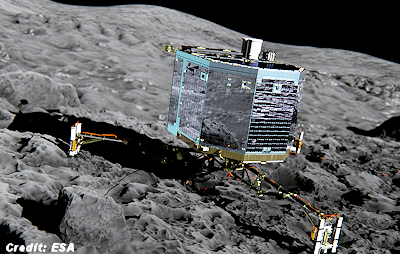Scientists Shoot Down Claim That Alien Life May Be on Comet
By Justin Worland
time.com
7-7-15
The findings did not hold up to scientific scrutiny
Scientists have picked holes in a widely-reported presentation by researchers claiming microbial life may exist on the comet now home to the Philae lander.
The claim originated in a presentation before the Royal Astronomical Society, in which researchers said the makeup of the comet, 67/P Churyumov-Gerasimenko, suggested the presence of living organisms. The scientists argued that data from Rosetta, the European Space Agency probe orbiting the comet, showed the capacity for micro-organisms to eke out life beneath the comet’s black crust.
But the findings did not hold up to scientific scrutiny. . . .


